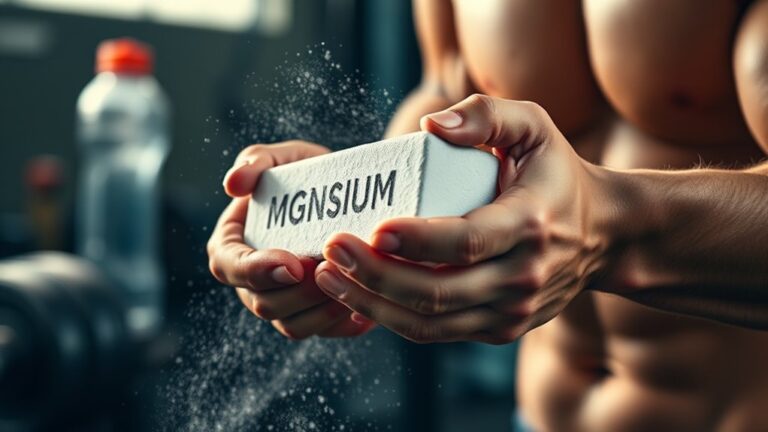The Best Supplements for Seasonal Gym Training
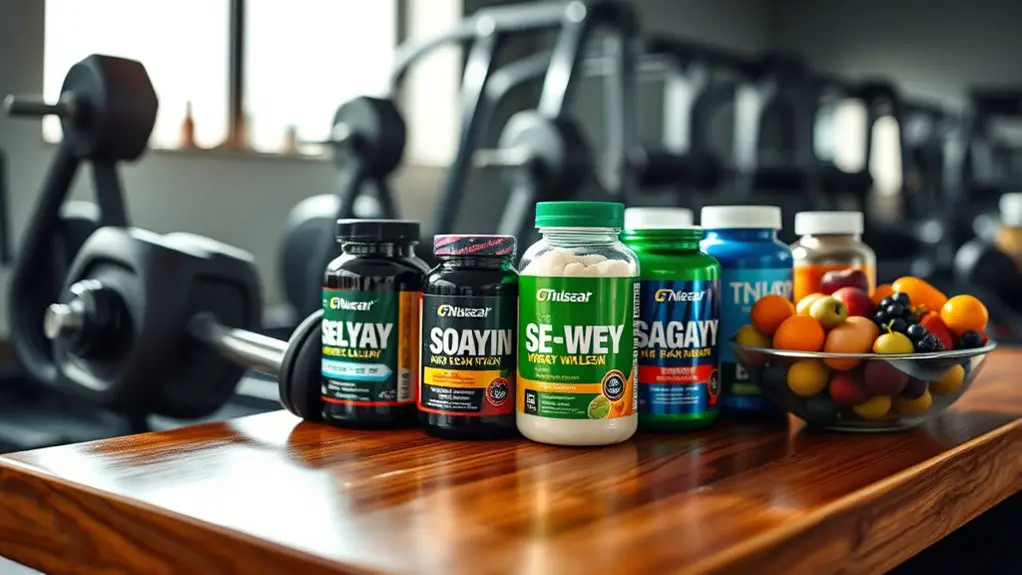
To optimize your gym performance throughout the year, tailor your supplements to each season. In spring, focus on energy boosters like green tea and BCAAs. For summer endurance, rely on hydration aids and caffeine sources. As fall approaches, prioritize strength support with creatine and whey protein. Finally, during winter, guarantee proper recovery through protein and antioxidants. Each season brings unique challenges, and adjusting your supplement routine can enhance results. Discover the best strategies suited to your goals.
Understanding Seasonal Training Needs
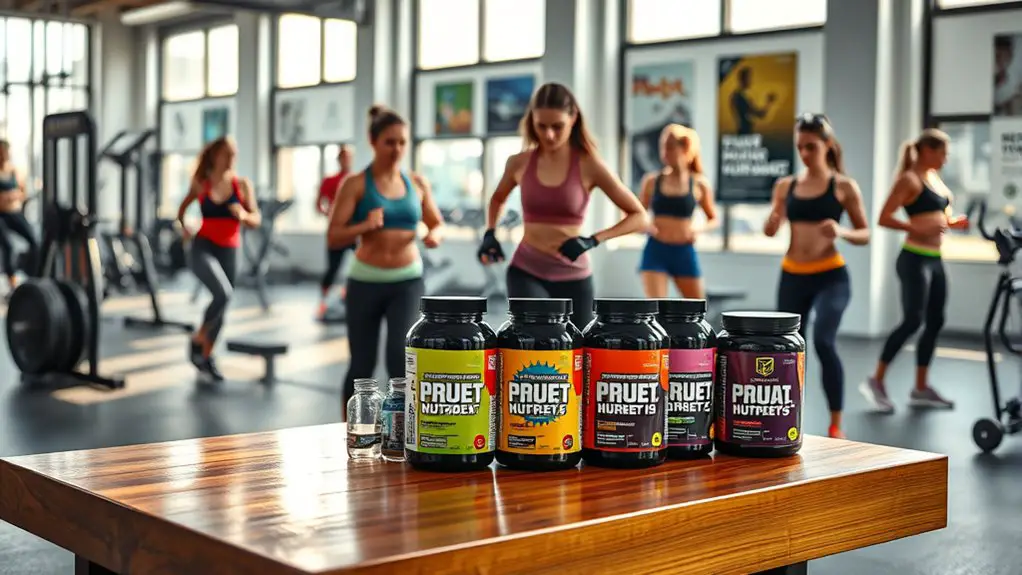
As you shift between seasons, understanding your training needs can make all the difference in achieving your fitness goals. Seasonal adaptations are essential for optimizing your performance, as each season presents unique challenges and opportunities. For example, you might focus on endurance during warmer months when outdoor activities flourish, while winter might necessitate more strength training indoors.
Adapting your training cycles to these seasonal changes can enhance your results. Research suggests varying your workouts not only helps prevent plateaus but also reduces the risk of injury. Consider incorporating different exercises to challenge your body in new ways, such as switching to high-intensity interval training (HIIT) in spring or focusing on flexibility and recovery during fall.
Top Supplements for Spring Energy Boost
As you ramp up your spring training, it’s essential to evaluate supplements that can enhance your energy and recovery. Natural energy enhancers, muscle recovery aids, and effective hydration solutions with electrolytes can make a significant difference in your performance. Incorporating these supplements into your routine can help you stay energized and hydrated as you tackle your fitness goals.
Natural Energy Enhancers
Spring often brings a renewed sense of energy, making it the perfect time to ramp up your gym training. To keep your energy levels high, consider these natural energy enhancers:
- Green Tea: A fantastic natural caffeine source, it not only boosts energy but also enhances fat oxidation during workouts.
- Rhodiola Rosea: This adaptogenic herb helps combat fatigue and improve endurance, allowing you to push through those tough workouts.
- Maca Root: Known for its energy-boosting properties, maca can enhance stamina and support overall vigor, making it an excellent addition to your routine.
Incorporating these supplements can help you harness the energy of spring, leading to more productive gym sessions and improved performance.
Muscle Recovery Aids
To maximize your energy and performance at the gym, it’s essential to focus on muscle recovery as well. Incorporating effective muscle recovery aids can enhance your overall training experience, especially in spring when energy levels fluctuate. Consider supplements like branched-chain amino acids (BCAAs) to reduce muscle soreness and promote recovery. Creatine is another great option, as it helps replenish energy stores and supports muscle repair. Additionally, omega-3 fatty acids can reduce inflammation, aiding in faster recovery. Pair these supplements with proper recovery techniques, such as stretching and foam rolling, to further improve your performance. Prioritizing muscle recovery not only helps you bounce back quicker but also prepares you for your next workout, ensuring you stay energized throughout the season.
Hydration and Electrolytes
Staying properly hydrated is essential for maintaining energy levels during your workouts, especially when temperatures rise in spring. To optimize your hydration strategies, consider these top supplements:
- Electrolyte Powders: These are convenient for replenishing sodium, potassium, and magnesium, vital for muscle function and preventing cramping.
- Coconut Water: A natural source of electrolytes, it’s low in calories and high in potassium, perfect for post-workout hydration.
- BCAA Drinks: Branched-chain amino acids help in muscle recovery and hydration, providing an extra boost during intense training sessions.
Incorporating these electrolyte sources into your routine will guarantee you stay energized and perform your best as you tackle spring workouts. Don’t underestimate the power of hydration!
Essential Nutrients for Summer Endurance
As summer training ramps up, staying hydrated and maintaining electrolyte balance becomes essential for endurance. You’ll also want to reflect on energy-boosting supplements to help sustain your performance and muscle recovery essentials to repair any wear and tear. Let’s explore how these nutrients can enhance your summer workouts effectively.
Hydration and Electrolyte Balance
While you might focus on strength and endurance during summer workouts, neglecting hydration and electrolyte balance can undermine your progress and performance. Staying hydrated is vital, especially in the heat. Here are some effective hydration strategies:
- Drink water regularly: Aim for at least 8-10 glasses a day, adjusting based on your activity level.
- Incorporate electrolyte sources: Foods like bananas, spinach, and avocados provide essential electrolytes, while sports drinks can replenish lost minerals during intense sessions.
- Monitor your urine color: A pale yellow indicates proper hydration, whereas darker shades signal the need for more fluids.
Energy-Boosting Supplements
Maintaining hydration is just one part of optimizing your performance during summer workouts. To truly boost your energy, consider incorporating caffeine sources like coffee or tea, and look for pre-workout formulas that contain these stimulants. Energy gels can also provide quick carbs for sustained energy during long sessions. Natural stimulants, such as green tea extract, can enhance your focus and endurance. Adaptogen blends help your body adapt to stress, supporting overall stamina. Additionally, B vitamin complexes play an essential role in energy production, while amino acid boosters can reduce fatigue. Finally, herbal energizers like ginseng or rhodiola can elevate your energy levels naturally, allowing you to push through those hot summer workouts effectively.
Muscle Recovery Essentials
To maximize your summer training, it’s crucial to prioritize muscle recovery after intense workouts. Effective recovery strategies will aid muscle repair and prepare you for your next session. Here are three key nutrients to focus on:
- Protein: Consuming high-quality protein post-workout helps repair muscle fibers and promotes growth. Aim for at least 20-30 grams.
- Electrolytes: Replenishing electrolytes lost through sweat prevents cramping and supports hydration. Include sodium, potassium, and magnesium in your recovery drinks.
- Omega-3 Fatty Acids: These healthy fats have anti-inflammatory properties that can reduce muscle soreness. Consider supplements or incorporate fatty fish into your diet.
Fall Supplements for Strength Maintenance
As the crisp air of fall sets in, many gym-goers face the challenge of maintaining strength during a season often filled with distractions and adjustments in routine. To keep your fall workouts effective, consider incorporating specific strength supplements to support your goals.
| Supplement | Benefits |
|---|---|
| Creatine | Enhances strength and power |
| Whey Protein | Supports muscle repair |
| Beta-Alanine | Delays fatigue, boosts endurance |
| Branched-Chain Amino Acids (BCAAs) | Reduces muscle soreness |
Winter Recovery Aids for Cold Weather Workouts
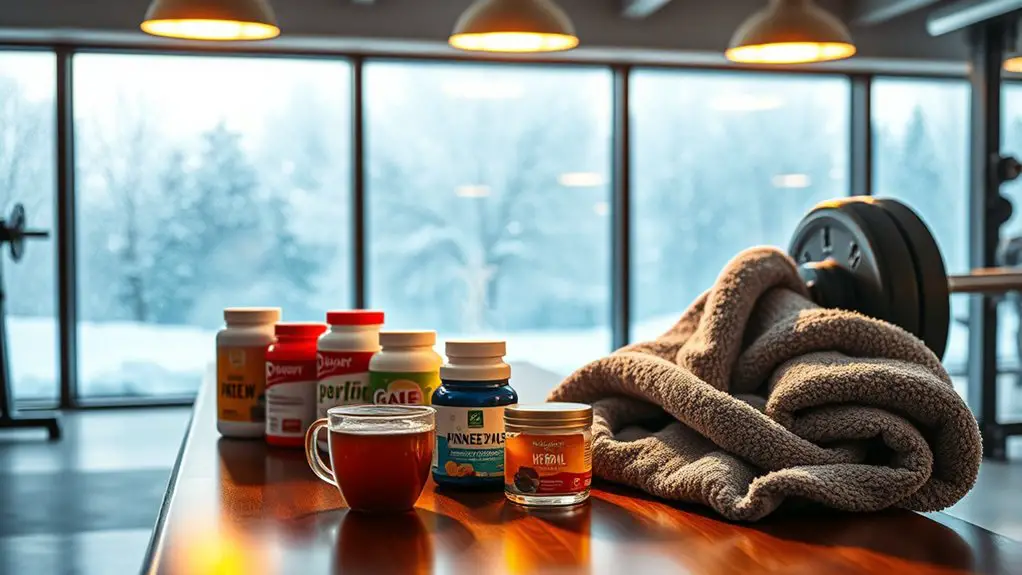
As winter workouts can be particularly taxing on your body, staying hydrated is essential for recovery. Cold weather often masks feelings of thirst, so make sure you’re regularly replenishing fluids. Additionally, focusing on key nutrients like protein and antioxidants can help your muscles recover and reduce inflammation after those chilly exercise sessions.
Importance of Hydration
Although many people associate hydration primarily with hot summer months, staying properly hydrated during winter workouts is equally essential for your performance and recovery. Cold air can dehydrate you just as much as heat, and it’s important to debunk some hydration myths that suggest you need less water in winter.
Here are three effective hydration strategies to contemplate:
- Drink Regularly: Don’t wait until you feel thirsty; sip water throughout your workout.
- Monitor Urine Color: Light yellow indicates good hydration, while dark yellow suggests you need more fluids.
- Include Electrolytes: Think about drinks with electrolytes to replenish what you lose through sweat.
Key Nutrients for Recovery
When temperatures drop and you push your limits in winter workouts, your body needs specific nutrients to recover effectively. Key recovery strategies include focusing on protein, carbohydrates, and healthy fats. Consuming protein post-workout helps repair muscle tissues, while carbohydrates replenish glycogen stores, especially essential in cold weather. Aim for nutrient timing by eating a balanced meal within 30 to 60 minutes after your session. Incorporating antioxidants like vitamin C and E can also combat oxidative stress from intense training. Don’t forget omega-3 fatty acids, which help reduce inflammation. Finally, stay hydrated, as your body still needs fluids despite the cold. By prioritizing these nutrients, you’ll enhance your recovery and be ready for the next workout.
The Role of Protein in Seasonal Fitness
While you may focus on different training goals throughout the seasons, protein remains an essential component of your fitness regimen. Understanding protein types and protein timing can greatly enhance your seasonal training results. Here’s what you should consider:
- Protein Types: Opt for a mix of animal-based (like whey and casein) and plant-based proteins (like pea and hemp) to cover all essential amino acids.
- Protein Timing: Consume protein within 30 minutes post-workout to optimize muscle recovery and growth. This is vital, especially during intense training periods.
- Daily Intake: Aim for about 1.2 to 2.2 grams of protein per kilogram of body weight, adjusting according to your specific fitness goals and seasonal shifts.
Hydration Supplements for Year-Round Performance
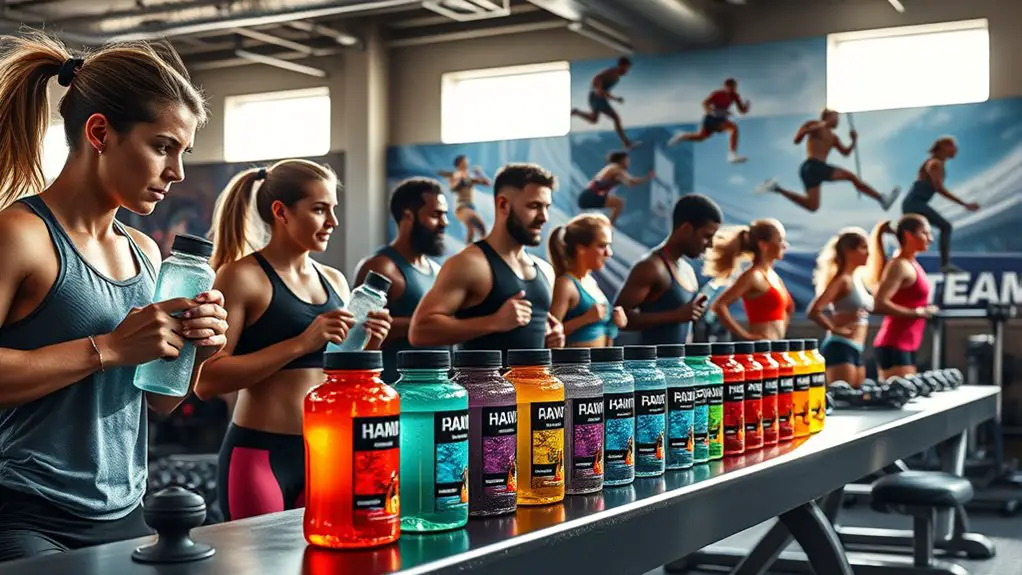
As your training intensifies throughout the year, maintaining proper hydration is vital for performance and recovery. Implementing effective hydration strategies can make a significant difference in your workouts. Start by verifying you’re consuming adequate water daily, but don’t overlook the importance of electrolytes, especially during intense sessions.
Electrolyte sources like sodium, potassium, and magnesium help replace what you lose through sweat. Consider using hydration supplements, such as electrolyte powders or drinks, to enhance your fluid intake. These products often contain a balanced blend of electrolytes that can prevent dehydration and muscle cramps, boosting your endurance.
To maximize benefits, sip on these supplements before, during, and after your workouts. Tailoring your hydration approach to your training volume and intensity will guarantee you stay at your best, no matter the season. Remember, staying hydrated isn’t just about water; it’s about keeping your body’s electrolyte levels balanced for peak performance.
Vitamins and Minerals for Immune Support
Staying hydrated is just one part of optimizing your training, especially as seasons change and your body faces new challenges. To support your immune system, consider incorporating these immune-boosting vitamins and minerals into your routine:
- Vitamin C: Known for its role in white blood cell function, include citrus fruits or supplements to enhance your immune response.
- Vitamin D: Often lacking in winter months, this vitamin is vital for immune health; consider getting sunlight or taking a supplement.
- Zinc: Essential for immune cell development, foods like nuts and seeds can help improve mineral absorption strategies.
Adaptogens for Stress Management in Different Seasons
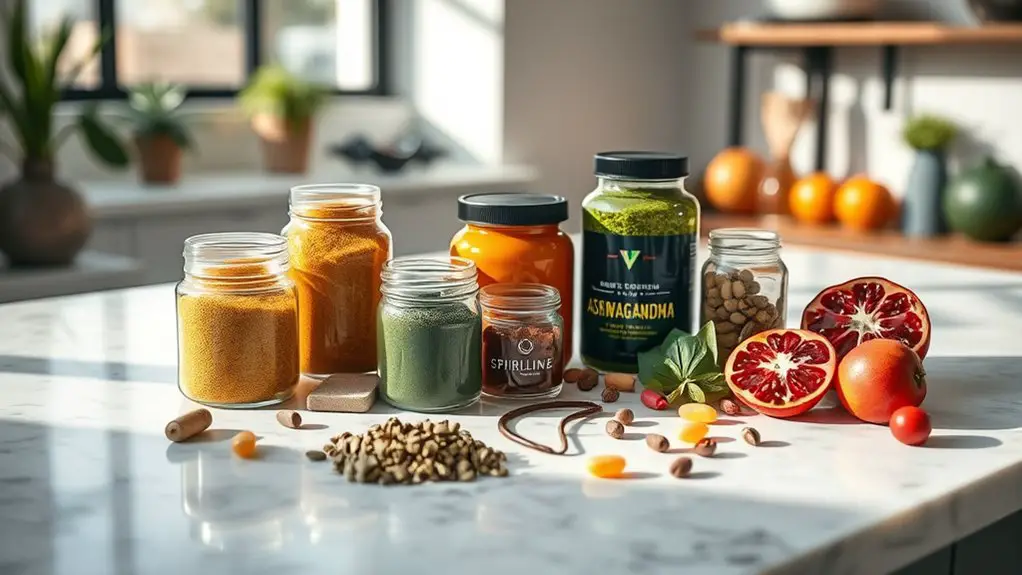
When the seasons change, so do the stressors on your mind and body, making it essential to explore adaptogens for better stress management. These natural substances, like ashwagandha, rhodiola, and holy basil, can help your body adapt to seasonal stressors by regulating cortisol levels and supporting overall well-being. Research shows that adaptogen benefits include enhanced resilience to physical and emotional stress, improved energy levels, and better mental clarity.
During the winter months, you might feel more stressed due to shorter days and holiday pressures. On the other hand, summer can bring its own set of challenges, like heat-related fatigue. Incorporating adaptogens into your routine can help you cope with these fluctuations. By balancing your body’s response to stress, these powerful herbs can promote a more stable mood and improved performance in the gym, regardless of the season.
Creating a Supplement Schedule for Optimal Results
To achieve ideal results from your supplements, it’s important to create a structured schedule that aligns with your training goals and seasonal changes. Proper supplement timing and adherence to dosage recommendations can maximize benefits. Here’s how to structure your schedule effectively:
- Pre-Workout: Take energy-boosting supplements, like caffeine or BCAAs, 30-60 minutes before workouts for enhanced performance.
- Post-Workout: Consume protein and recovery supplements within 30 minutes after exercising to optimize muscle repair and growth.
- Daily Maintenance: Incorporate vitamins and minerals at consistent times each day, ideally with meals, to make sure your body gets what it needs to support overall health.
Frequently Asked Questions
Can Supplements Replace a Balanced Diet During Seasonal Training?
Can supplements really take the place of a balanced diet? While they can enhance your performance, they can’t replace the essential nutrients your body needs for peak health. Relying solely on supplements may hinder your nutrient absorption, leading to imbalances. A balanced diet provides a variety of vitamins and minerals that support overall wellness. So, think of supplements as a complement, not a substitute, to your dietary balance during seasonal training.
Are There Any Side Effects of Seasonal Supplements?
When considering seasonal supplements, you should be aware of potential side effects. While many people tolerate these products well, some common side effects include gastrointestinal discomfort, headaches, or allergic reactions. It’s crucial to research the specific ingredients in your chosen supplements, as they can vary widely. Always consult with a healthcare professional before starting any new supplement regimen to verify they’re appropriate for your needs and won’t negatively impact your health.
How Do I Choose the Right Supplement for My Fitness Goals?
To choose the right supplement for your fitness goals, start with a thorough fitness assessment. It’ll help you understand your current status and identify areas for improvement. Next, align your supplement choices with your specific goals, whether it’s muscle gain, fat loss, or enhanced endurance. Research ingredients and check for evidence supporting their effectiveness. Finally, consult with a healthcare professional to guarantee safety and suitability for your unique needs.
When Is the Best Time to Take My Supplements?
The best time to take your supplements depends on your routine. For ideal results, consider incorporating them into your morning routine; this can help kickstart your metabolism. If you’re taking pre-workout supplements, aim to consume them about 30 minutes before your gym session for maximum effectiveness. Remember, consistency is key, so find a schedule that fits your lifestyle and stick with it. This way, you’ll support your fitness goals more effectively.
Can I Stack Different Supplements Safely for Seasonal Training?
Stacking different supplements can feel like mixing colors on a palette; with the right combinations, you can create a masterpiece for your fitness goals. However, you should always follow safety guidelines to guarantee you’re not overloading your body. Research shows that certain supplement combinations can enhance performance, while others might clash. Always consult with a healthcare professional before diving in, and listen to your body to find what works best for you.
